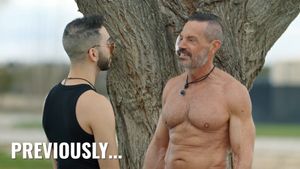Treatment GuideJust DiagnosedSex & DatingAfrican AmericanStigmaAsk the HIV DocPrEP En EspañolNewsVoicesPrint IssueVideoOut 100
CONTACTCAREER OPPORTUNITIESADVERTISE WITH USPRIVACY POLICYPRIVACY PREFERENCESTERMS OF USELEGAL NOTICE
© 2025 Pride Publishing Inc.
All Rights reserved
All Rights reserved
By continuing to use our site, you agree to our Private Policy and Terms of Use.
I had a little difficulty choosing a topic for this column. I did, however, find it difficult to write about. Typically, writing for me is as natural as breathing. Words easily connect with one another, crisply and clearly revealing what they ought. And certain topics I've covered--including those as difficult as my own depression or my best friend's physical assault--were relatively easy to narrate, compared with the one I chose for this column. Perhaps this speaks to the depth of its intensity and the work lying ahead of me to process it. Perhaps it also reveals that some experiences are beyond words. A scant three months--90 short days--separate the two most painful and pivotal moments of my life: October 1, 2004, and January 4, 2005. On October 1, I received my HIV diagnosis. On January 4 my mother died. To this day I am uncertain how I got through it. In my previous column I discussed depression from an attitudinal perspective--those moments in life where we shut down, unaware of our choices and unconsciously choose 'nothing' rather than 'something.' I wrote of the warm, sunny day in Chicago where my temptation was to hide indoors rather than enjoy the day. I implied in that column that the solution to melancholy frequently resides in one's thinking; that a shift toward what's possible dislodges one's depression and allows space for some contentment. October 1 to January 4 was impervious to such a solution. There I was, barely able to comprehend my own diagnosis that stirred notions of my own mortality. And there I was, confronted with the very final mortality of the woman who gave birth to me, raised me, loved me, and knew me longer than anyone else possibly could. She was gone. Forever. As I said above, to this day I am uncertain how I got through it. Here's the short answer: I did a lot of healthy things, I did a lot of self-destructive things, I did what felt familiar, I tried to do my best, I did more self-destructive things, I cried a lot, I went to therapy, I did some more self-destructive things, I asked for help, I did what felt good, I took medication, I took others' advice, I did some more self-destructive things. In the final analysis I encountered the limits of my understanding, my training, my self-will, my determination, my intellect. I needed a lot more help than I thought because I didn't have the answers, and I was more lost than I ever thought I could be. The truth is that I survived out of desperation and even with a pattern of poor decision-making and self-destruction, managed to find the courage to ask for help. And it goes without saying that I was grateful that such help exists in the first place. You see, when traumatic, life-changing events occur, people seldom respond in tactful, measured and sane responses. They usually just freak out and try to do their best. As I write this, I feel anxious given the level of vulnerability I am showing. It feels that I may be revealing too much. And at the same time it feels liberating. I had never thought of myself as a strong person--had always wondered how I would respond if something 'really bad' happened. I still sometimes question how 'strong' I truly am. One thing I cannot question, however, is whether I'm resilient. Fransen is a licensed clinical social worker who is in private therapy practice in Chicago. He welcomes feedback at stillpoint4003@yahoo.com.
From our Sponsors
Most Popular
Why activist Raif Derrazi thinks his HIV diagnosis is a gift
September 17 2024 12:00 PM
How fitness coach Tyriek Taylor reclaims his power from HIV with self-commitment
September 19 2024 12:00 PM
Out100 Honoree Tony Valenzuela thanks queer and trans communities for support in his HIV journey
September 18 2024 12:00 PM
The freedom of disclosure: David Anzuelo's journey through HIV, art, and advocacy
August 02 2024 12:21 PM
Creator and host Karl Schmid fights HIV stigma with knowledge
September 12 2024 12:03 PM
From ‘The Real World’ to real life: How Danny Roberts thrives with HIV
July 31 2024 5:23 PM
Eureka is taking a break from competing on 'Drag Race' following 'CVTW' elimination
August 20 2024 12:21 PM
California confirms first case of even more deadly mpox strain
November 18 2024 3:02 PM
Plus: Featured Video
Latest Stories
A camp for HIV-positive kids is for sale. Here's why its founder is celebrating
January 02 2025 12:21 PM
This long-term HIV survivor says testosterone therapy helped save his life.
December 16 2024 8:00 PM
'RuPaul's Drag Race' star Trinity K Bonet quietly comes out trans
December 15 2024 6:27 PM
Ricky Martin delivers showstopping performance for 2024 World AIDS Day
December 05 2024 12:08 PM
AIDS Memorial Quilt displayed at White House for the first time
December 02 2024 1:21 PM
Decades of progress, uniting to fight HIV/AIDS
December 01 2024 12:30 PM
Hollywood must do better on HIV representation
December 01 2024 9:00 AM
Climate change is disrupting access to HIV treatment
November 25 2024 11:05 AM
Post-election blues? Some advice from mental health experts
November 08 2024 12:36 PM
Check out our 2024 year-end issue!
October 28 2024 2:08 PM
Meet our Health Hero of the Year, Armonté Butler
October 21 2024 12:53 PM
AIDS/LifeCycle is ending after more than 30 years
October 17 2024 12:40 PM
Twice-yearly injectable lenacapavir, an HIV-prevention drug, reduces risk by 96%
October 15 2024 5:03 PM
Kentucky bans conversion therapy for youth as Gov. Andy Beshear signs 'monumental' order
September 18 2024 11:13 AM
Study finds use of puberty blockers safe and reversible, countering anti-trans accusations
September 11 2024 1:11 PM
Latinx health tips / Consejos de salud para latinos (in English & en espanol)
September 10 2024 4:29 PM
The Trevor Project receives $5M grant to support LGBTQ+ youth mental health in rural Midwest (exclusive)
September 03 2024 9:30 AM
Introducing 'Health PLUS Wellness': The Latinx Issue!
August 30 2024 3:06 PM
La ciencia detrás de U=U ha estado liberando a las personas con VIH durante años
August 23 2024 2:48 PM
Trending stories
Recommended Stories for You

















































































